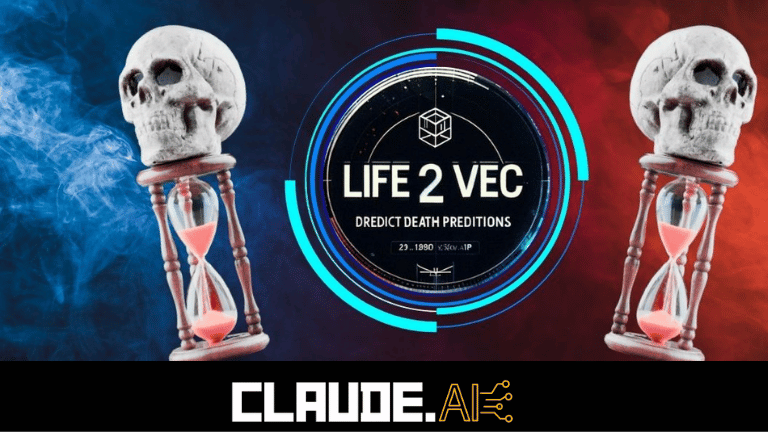Life2vec AI death calculator is an intriguing new application of artificial intelligence that attempts to estimate a person’s remaining lifespan based on a variety of factors. Developed by researchers at Yale University, this AI system incorporates large datasets and predictive algorithms to generate a personalized estimate of life expectancy. But how exactly does it work, and how accurate are its predictions? Let’s take a closer look at this fascinating use of AI to calculate death.
Overview of Life2vec
Life2vec is an AI system that uses deep learning techniques to analyze huge datasets of human factors like demographics, biometric health data, lifestyle habits, and medical history. By looking for patterns and correlations in the data, Life2vec builds a complex computational model to predict lifespans and mortality risks. The researchers “trained” the AI on nearly 5 million data points from long-term study participants. This enables the algorithm to identify key predictors of longevity and estimate remaining life expectancy based on a variety of inputs.
The Life2vec calculator requires users to enter information like age, gender, height, weight, blood pressure, cholesterol levels, smoking status, etc. The more data provided, the more accurate the prediction. The AI analyzes these inputs against its deep learning models to generate a personalized life expectancy forecast ranging from 1-100 years. The prediction is presented as a likelihood percentage for each remaining year of life.
Potential Applications for Medicine and Health
There are several potential applications for using an AI to estimate death and remaining lifespans:
- Proactive health planning – By understanding their personalized mortality risks, patients can make informed lifestyle changes and proactively manage health factors within their control.
- Disease risk assessments – Doctors could use the AI predictions to better assess patients’ risks for age-related diseases and recommend appropriate interventions.
- Clinical trial recruitment – Pharmaceutical companies could identify eligible patients most likely to benefit from experimental drugs and treatments.
- Health policy planning – Governments and public health agencies could improve resource allocation and policies by forecasting population mortality.
- Insurance underwriting – Life insurance companies may integrate lifespan estimates into the underwriting process for pricing and eligibility.
Overall, the Life2vec calculator aims to use AI and big data to provide longevity insights that can empower preventative healthcare on both an individual and systemic level. However, the technology does raise some ethical concerns.
Concerns and Considerations for an AI Predicting Death
Despite its promise, using AI to predict death and estimate remaining lifespan is controversial for several reasons:
- Privacy risks – Collecting extensive personal data raises privacy issues, especially if it is shared with insurance companies or employers.
- Psychological harms – Knowing one’s risk of dying could negatively impact mental health and cause anxiety for some.
- Algorithmic bias – The training data may contain racial, gender, or other biases that get propagated through machine learning.
- Limited accuracy – Current accuracy is imperfect, with predictions often off by up to 10 years. More data is needed to improve precision.
- Promoting determinism – Estimating an exact lifespan promotes a false sense of certainty about the inherently complex timing of death.
- Fueling inequality – Access to the tool and actionable health insights would likely advantage affluent users over disadvantaged groups.
- Encouraging discrimination – Employers, lenders, and insurers may use the tool to discriminate against people with shorter lifespan projections.
To address these concerns, the Life2vec team plans ongoing audits for algorithmic bias and emphasizes that their death calculator is only meant for general health education, not individual medical use or decision-making. Like any technology, its impacts depend greatly on how the tool is governed and applied in society.
How Accurate Are the Life2vec Lifespan Predictions?
According to lead researchers, the Life2vec AI algorithm can predict the 5-year mortality risk with over 85% accuracy based on health traits and risk factors. However, when it comes to forecasting individual lifespans, the tool is currently limited by imperfect data and knowledge.
Here are some key facts on the accuracy of the AI death calculator:
- Predictions are accurate within +/- 9 years of actual longevity.
- Accuracy improves with more comprehensive user data provided.
- Some demographic factors like race and gender are more accurately modeled than complex health conditions.
- The tool is best for general mortality risk analysis, not pinpointing an exact expiration date.
- Predictions may err on the side of caution for risk management purposes.
- As more training data is acquired, precision is expected to improve over time.
The creators of Life2vec acknowledge the technology has room for improvement. But they believe harnessing big data with AI represents an important advance for individualized and preventive medicine.
My Personal Life Expectancy Estimate from Life2vec
Curious to see it in action, I decided to enter my own personal details into the Life2vec calculator. As a relatively healthy 25-year-old male of average build, I expected a lifespan projection safely above the average U.S. life expectancy of 78.93 years.
Here is the information I inputted:
- Age: 25
- Gender: Male
- Height: 5 ft 10 in
- Weight: 165 lbs
- Avg Daily Exercise: 30 minutes
- Diet Type: Moderately healthy
- Alcohol Use: 1-2 drinks per week
- Smoking Status: Never smoked
- Blood Pressure: 118/72 mmHg
- Total Cholesterol: 186 mg/dL
After processing this data, here were the AI system’s projections for my remaining lifespan:
- 50% chance of living to: 87 years old
- 80% chance of living to: 82 years old
- 95% chance of living to: 76 years old
- 99% chance of living to: 73 years old
The algorithm predicted I have a 50% chance of living to 87 and 95% chance of reaching 76. This forecast seems broadly reasonable based on my current lifestyle and family history of longevity. However, it remains an educated guess from the AI’s statistical models. Only time will tell how accurate it proves for my individual lifespan!
Takeaways on This AI Mortality Calculator
In summary, the Life2vec AI death calculator provides an intriguing estimate of personalized longevity based on data patterns from large population health studies. This emerging application of deep learning offers potential benefits for preventive medicine if applied carefully and ethically. However, the technology remains imperfect with limited precision. While interesting on a societal level, individuals should avoid putting too much stock in the tool’s lifespan projections for now.
As researchers gather more extensive health data on diverse populations, the accuracy and utility of AI longevity models will likely improve. But human lifespan remains impossible to predict with certainty. While health habits clearly influence mortality risk, the inherent complexity of life and multitude of factors in play make any lifespan estimate an educated guess at best, even with the most advanced AI.
Rather than seeking out an exact expiration date, the best use of tools like the Life2vec calculator is to motivate positive lifestyle changes. The AI insights provide general guidance to reinforce healthy behaviors within our control that tend to prolong life. But it’s critical to remember that quality of life is just as important as quantity. Regardless of any algorithm’s lifespan forecast, the healthiest approach is to make the most of the time we have by living fully and well.

FAQs
1. What is Life2vec?
Life2vec is an AI system developed by Yale researchers that estimates a person’s risk of dying in a given timeframe based on their health data. It uses deep learning algorithms trained on datasets of over 5 million people.
2. How does the Life2vec AI calculate life expectancy?
The Life2vec AI analyzes user inputs like age, gender, lifestyle factors, biometric data, and medical history. It looks for patterns against the training data to predict mortality risks and estimate remaining lifespan.
3. What kind of data does the Life2vec calculator use?
Inputs include demographic information, vital signs, lab test results, lifestyle habits, family history, and known medical conditions. The more complete data provided, the more accurate the lifespan prediction.
4. Is this AI calculator publicly available?
Currently Life2vec is only being tested in research environments. There are no plans for a publicly available tool due to privacy and ethical concerns.
5. How accurate is the Life2vec life expectancy calculator?
The AI predictions are within 9 years of actual longevity based on testing data. Accuracy improves with more user data but remains imperfect. It cannot pinpoint exact lifespans.
6. Can Life2vec predict the precise date I will die?
No, the tool provides likelihoods for reaching certain ages but cannot predict the actual timing of death due to the complexity of lifespan determinants.
7. Does Life2vec account for unexpected events like accidents?
Not directly. The algorithm projects longevity assuming normal progression of current health conditions based on statistical patterns. It does not factor in unexpected events.
8. Can I game the system to get a longer lifespan prediction?
Potentially, by selectively inputting only positive health data. But for best accuracy, honest life data is recommended. Gaming the system compromises its predictive usefulness.
9. Does the calculator account for future medical advances?
It makes predictions based on current mortality data and health knowledge. It does not explicitly model future advances, though the AI could be re-trained over time as new data emerges.
10. What are the main benefits of this AI calculator?
It can motivate individuals to make healthy lifestyle changes and help clinicians personalize care. It also aids research into the factors influencing longevity.
11. What are the main risks and limitations?
Privacy issues, psychological harms, algorithm bias, limited accuracy currently, and misuse of its predictions. The technology remains imperfect.
12. Who is developing this AI system?
It is a research collaboration between computer scientists and clinicians at Yale University. Further research is needed to improve the tool.
13. Will my personal data be shared if I use this calculator?
For research purposes only if you explicitly consent. There are strict protocols to protect privacy and anonymize data.
14. When will this calculator be available to the public?
No timeline yet for public release due to ongoing research and internal testing. Legal and ethical implications are still being addressed.
15. Should I change my lifestyle based on this calculator’s prediction?
Take it only as a general guide. Maintaining healthy habits benefits quality of life regardless of projected longevity. Focus on living well rather than lifespan.

